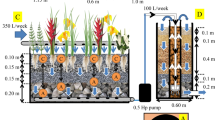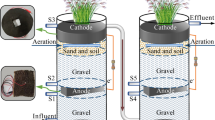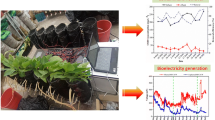Abstract
This study aimed to compare the performance of biofiltration, constructed wetland, and constructed wetland microbial fuel cell (CW-MFC). The transformation from a biofiltration unit to a hybrid CW-MFC was demonstrated with the advantages of improvement of wastewater treatment while generating electricity simultaneously. The introduction of plants to the upper region of the bioreactor enhanced the DO level by 0.8 mg/L, ammonium removal by 5 %, and COD removal by 1 %. The integration of electrodes and external circuits stimulated the degradation rate of organic matter in the anodic region (1 % without aeration and 3 % with aeration) and produced 5.13 mW/m3 of maximum power density. Artificial aeration improved the nitrification efficiency by 38 % and further removed the residual COD to an efficiency of 99 %. The maximum power density was also increased by 3.2 times (16.71 mW/m3) with the aid of aeration. In treating higher organic loading wastewater (3M), the maximum power density showed a significant increment to 78.01 mW/m3 (4.6-fold) and the COD removal efficiency was 98 %. The ohmic overpotential dominated the proportion of total loss (67-91 %), which could be ascribed to the low ionic conductivity. The reduction in activation and concentration loss contributed to the lower internal resistance with the additional aeration and higher organic loading. Overall, the transformation from biofiltration to a hybrid CW-MFC system is worthwhile since the systems quite resemble while CW-MFC could improve the wastewater treatment as well as recover energy from the treated wastewater.






Similar content being viewed by others
References
Al-Kdasi A, Idris A, Saed K, Guan CT (2004) Treatment of textile wastewater by advanced oxidation processes– A review. Global NEST J 6:222–230
Chai A, Wong YS, Ong SA, Aminah Lutpi N, Sam ST, Kee WC, Ng HH (2021) Haldane-Andrews substrate inhibition kinetics for pilot scale thermophilic anaerobic degradation of sugarcane vinasse. Bioresour Technol 336:125319. https://doi.org/10.1016/j.biortech.2021.125319
Chen D, Gu X, Zhu W, He S, Wu F, Huang J, Zhou W (2019) Denitrification- and anammox-dominant simultaneous nitrification, anammox and denitrification (SNAD) process in subsurface flow constructed wetlands. Bioresour Technol 271:298–305. https://doi.org/10.1016/j.biortech.2018.09.123
Crini G, Lichtfouse E (2019) Advantages and disadvantages of techniques used for wastewater treatment. Environ Chem Lett 17:145–155. https://doi.org/10.1007/s10311-018-0785-9
Cui B, Yang Q, Zhang Y, Liu X, Wu W, Li J (2019) Improving nitrogen removal in biological aeration filter for domestic sewage treatment via adjusting microbial community structure. Bioresour Technol 293:122006. https://doi.org/10.1016/j.biortech.2019.122006
Dai Z, Heidrich ES, Dolfing J, Jarvis AP (2019) Determination of the Relationship between the Energy Content of Municipal Wastewater and Its Chemical Oxygen Demand. Environ Sci Technol Lett 6:396–400. https://doi.org/10.1021/acs.estlett.9b00253
Doherty L, Zhao Y, Zhao X, Hu Y, Hao X, Xu L, Liu R (2015) A review of a recently emerged technology: Constructed wetland - Microbial fuel cells. Water Res 85:38–45. https://doi.org/10.1016/j.watres.2015.08.016
dos Santos AB, Cervantes FJ, van Lier JB (2007) Review paper on current technologies for decolourisation of textile wastewaters: Perspectives for anaerobic biotechnology. Bioresour Technol 98:2369–2385. https://doi.org/10.1016/j.biortech.2006.11.013
Ebrahimi A, Sivakumar M, McLauchlan C (2021a) A taxonomy of design factors in constructed wetland-microbial fuel cell performance: A review. J Environ Manag 291:112723. https://doi.org/10.1016/j.jenvman.2021.112723
Ebrahimi A, Sivakumar M, McLauchlan C, Ansari A, Vishwanathan AS (2021b) A critical review of the symbiotic relationship between constructed wetland and microbial fuel cell for enhancing pollutant removal and energy generation. J Environ Chem Eng 9:105011. https://doi.org/10.1016/j.jece.2020.105011
Fang Z, Song HL, Cang N, Li XN (2013) Performance of microbial fuel cell coupled constructed wetland system for decolorization of azo dye and bioelectricity generation. Bioresour Technol 144:165–171. https://doi.org/10.1016/j.biortech.2013.06.073
Fang Z, Song H, Cang N, Li X (2015) Electricity production from Azo dye wastewater using a microbial fuel cell coupled constructed wetland operating under different operating conditions. Biosens Bioelectron 68:135–141. https://doi.org/10.1016/j.bios.2014.12.047
Ge Z, Li J, Xiao L, Tong Y, He Z (2014) Recovery of electrical energy in microbial fuel cells. Environ Sci Technol Lett 1:137
Gil GC, Chang IS, Kim BH, Kim M, Jang JK, Park HS, Kim HJ (2003) Operational parameters affecting the performance of a mediator-less microbial fuel cell. Biosens Bioelectron 18:327–334. https://doi.org/10.1016/S0956-5663(02)00110-0
Gilbert S, Gasperi J, Rocher V, Lorgeoux C, Chebbo G (2012) Removal of alkylphenols and polybromodiphenylethers by a biofiltration treatment plant during dry and wet-weather periods. Water Sci. Technol. a. J Int Assoc Water Pollut Res 65:1591–1598. https://doi.org/10.2166/wst.2012.055
González T, Puigagut J, Vidal G (2021) Organic matter removal and nitrogen transformation by a constructed wetland-microbial fuel cell system with simultaneous bioelectricity generation. Sci Total Environ 753:142075. https://doi.org/10.1016/j.scitotenv.2020.142075
Gude VG (2018) Microbial fuel cells as a platform technology for sustainable wastewater treatment. In: Progress and Recent Trends in Microbial Fuel Cells. Elsevier B.V. https://doi.org/10.1016/B978-0-444-64017-8.00018-X
Hu Y, He F, Ma L, Zhang Y, Wu Z (2016) Microbial nitrogen removal pathways in integrated vertical-flow constructed wetland systems. Bioresour Technol 207:339–345. https://doi.org/10.1016/j.biortech.2016.01.106
Kartal B, Maalcke WJ, De Almeida NM, Cirpus I, Gloerich J, Geerts W, Op Den Camp HJM, Harhangi HR, Janssen-Megens EM, Francoijs KJ, Stunnenberg HG, Keltjens JT, Jetten MSM, Strous M (2011) Molecular mechanism of anaerobic ammonium oxidation. Nature 479:127–130. https://doi.org/10.1038/nature10453
Yap KL, Ho LN, Ong SA, Guo K, Oon YS, Ong YP, Thor SH (2021) Crucial roles of aeration and catalyst on caffeine removal and bioelectricity generation in a double chambered microbial fuel cell integrated electrocatalytic process. J Environ Chem Eng 9:104636. https://doi.org/10.1016/j.jece.2020.104636
Zhao Y, Collum S, Phelan M, Goodbody T, Doherty L, Hu Y (2013) Preliminary investigation of constructed wetland incorporating microbial fuel cell: Batch and continuous flow trials. Chem Eng J 229:364–370. https://doi.org/10.1016/j.cej.2013.06.023
Kee W-C, Wong Y-S, Ong S-A, Lutpi NA, Sam S-T, Chai A, Ng H-H (2022) Insights into modified sequencing batch reactor for the treatment of sugarcane vinasse: role of recirculation process. Int J Environ Sci Technol. https://doi.org/10.1007/s13762-022-03946-x
Khan S, Ahmad I, Shah MT, Rehman S, Khaliq A (2009) Use of constructed wetland for the removal of heavy metals from industrial wastewater. J Environ Manag 90:3451–3457. https://doi.org/10.1016/j.jenvman.2009.05.026
Lai WL, Zhang Y, Chen ZH (2012) Radial oxygen loss, photosynthesis, and nutrient removal of 35 wetland plants. Ecol Eng 39:24–30. https://doi.org/10.1016/j.ecoleng.2011.11.010
Li W-W, Yu H-Q, Rittmann BE (2015) Reuse water pollutants. Nature 528:29–31
Li W, Li L, Qiu G (2017) Energy consumption and economic cost of typical wastewater treatment systems in Shenzhen. China J Clean Prod 163:S374–S378. https://doi.org/10.1016/j.jclepro.2015.12.109
Zhang PY, Liu ZL (2010) Experimental study of the microbial fuel cell internal resistance. J Power Sources 195:8013–8018. https://doi.org/10.1016/j.jpowsour.2010.06.062
Li C, He W, Liang D, Tian Y, Li J, Li Z, Feng Y (2022) Microbial separator allied biocathode supports simultaneous nitrification and denitrification for nitrogen removal in microbial electrochemical system. Bioresour Technol 345:126537. https://doi.org/10.1016/j.biortech.2021.126537
Loh ZZ, Zaidi NS, Syafiuddin A, Yong EL, Boopathy R, Kueh ABH, Prastyo DD (2021) Shifting from conventional to organic filter media in wastewater biofiltration treatment: A review. Appl Sci 11. https://doi.org/10.3390/app11188650
Logan BE, Hamelers B, Rozendal R, Schröder U, Keller J, Freguia S, Aelterman P, Verstraete W, Rabaey K (2006) Microbial fuel cells: Methodology and technology. Environ Sci Technol 40:5181–5192. https://doi.org/10.1021/es0605016
Longo S, d’Antoni BM, Bongards M, Chaparro A, Cronrath A, Fatone F, Lema JM, Mauricio-Iglesias M, Soares A, Hospido A (2016) Monitoring and diagnosis of energy consumption in wastewater treatment plants. A state of the art and proposals for improvement. Appl Energy 179:1251–1268. https://doi.org/10.1016/j.apenergy.2016.07.043
Martin E, Savadogo O, Guiot SR, Tartakovsky B (2010) The influence of operational conditions on the performance of a microbial fuel cell seeded with mesophilic anaerobic sludge. Biochem Eng J 51:132–139. https://doi.org/10.1016/j.bej.2010.06.006
McCarty PL, Bae J, Kim J (2011) Domestic Wastewater Treatment as a Net Energy Producer–Can This be Achieved? Environ Sci Technol 45:7100–7106. https://doi.org/10.1021/es2014264
Mittal Y, Dash S, Srivastava P, Mishra PM, Aminabhavi TM, Yadav AK (2022) Azo dye containing wastewater treatment in earthen membrane based unplanted two chambered constructed wetlands-microbial fuel cells: A new design for enhanced performance. Chem Eng J 427:131856. https://doi.org/10.1016/j.cej.2021.131856
Mohan SV, Raghavulu SV, Peri D, Sarma PN (2009) Integrated function of microbial fuel cell (MFC) as bio-electrochemical treatment system associated with bioelectricity generation under higher substrate load. Biosens Bioelectron 24:2021–2027. https://doi.org/10.1016/j.bios.2008.10.011
Ong SA, Uchiyama K, Inadama D, Yamagiwa K (2009) Simultaneous removal of color, organic compounds and nutrients in azo dye-containing wastewater using up-flow constructed wetland. J Hazard Mater 165:696–703. https://doi.org/10.1016/j.jhazmat.2008.10.071
Ong SA, Uchiyama K, Inadama D, Ishida Y, Yamagiwa K (2010a) Performance evaluation of laboratory scale up-flow constructed wetlands with different designs and emergent plants. Bioresour Technol 101:7239–7244. https://doi.org/10.1016/j.biortech.2010.04.032
Ong SA, Uchiyama K, Inadama D, Ishida Y, Yamagiwa K (2010b) Treatment of azo dye Acid Orange 7 containing wastewater using up-flow constructed wetland with and without supplementary aeration. Bioresour Technol 101:9049–9057. https://doi.org/10.1016/j.biortech.2010.07.034
Oon YL, Ong SA, Ho LN, Wong YS, Oon YS, Lehl HK, Thung WE (2015) Hybrid system up-flow constructed wetland integrated with microbial fuel cell for simultaneous wastewater treatment and electricity generation. Bioresour Technol 186:270–275. https://doi.org/10.1016/j.biortech.2015.03.014
Patil, S.S., Dhulap, V.P., Kaushik, G., 2016. Application of constructed wetland using eichhornia crassipes for sewage treatment. J Mater Environ Sci 7, 3256–3263.
Oon YL, Ong SA, Ho LN, Wong YS, Dahalan FA, Oon YS, Lehl HK, Thung WE (2016) Synergistic effect of up-flow constructed wetland and microbial fuel cell for simultaneous wastewater treatment and energy recovery. Bioresour Technol 203:190–197. https://doi.org/10.1016/j.biortech.2015.12.011
Oon YL, Ong SA, Ho LN, Wong YS, Dahalan FA, Oon YS, Lehl HK, Thung WE, Nordin N (2017) Role of macrophyte and effect of supplementary aeration in up-flow constructed wetland-microbial fuel cell for simultaneous wastewater treatment and energy recovery. Bioresour Technol 224:265–275. https://doi.org/10.1016/j.biortech.2016.10.079
Oon YL, Ong SA, Ho LN, Wong YS, Dahalan FA, Oon YS, Lehl HK, Thung WE, Nordin N (2018) Up-flow constructed wetland-microbial fuel cell for azo dye, saline, nitrate remediation and bioelectricity generation: From waste to energy approach. Bioresour Technol 266:97–108. https://doi.org/10.1016/j.biortech.2018.06.035
Riley SM, Ahoor DC, Cath TY (2018) Enhanced biofiltration of O&G produced water comparing granular activated carbon and nutrients. Sci Total Environ 640–641:419–428. https://doi.org/10.1016/j.scitotenv.2018.05.228
Sarioglu M, Bisgin T (2007) Removal of Maxilon Yellow GL in a mixed methanogenic anaerobic culture. Dyes Pigm 75:544–549. https://doi.org/10.1016/j.dyepig.2006.07.001
Serra PMD, Espírito-Santo A, Magrinho M (2020) A steady-state electrical model of a microbial fuel cell through multiple-cycle polarization curves. Renew Sust Energ Rev 117:109439. https://doi.org/10.1016/j.rser.2019.109439
Srivastava P, Yadav AK, Mishra BK (2015) The effects of microbial fuel cell integration into constructed wetland on the performance of constructed wetland. Bioresour Technol 195:223–230. https://doi.org/10.1016/j.biortech.2015.05.072
Srivastava P, Dwivedi S, Kumar N, Abbassi R, Garaniya V, Yadav AK (2017) Performance assessment of aeration and radial oxygen loss assisted cathode based integrated constructed wetland-microbial fuel cell systems. Bioresour Technol 244:1178–1182. https://doi.org/10.1016/j.biortech.2017.08.026
Teoh TP, Ong SA, Ho LN, Wong YS, Lutpi NA, Oon YL, Tan SM, Ong YP, Yap KL (2022b) Insights into the decolorization of mono and diazo dyes in single and binary dyes containing wastewater and electricity generation in up-flow constructed wetland coupled microbial fuel cell. Environ Sci Pollut Res. https://doi.org/10.1007/s11356-022-23101-w
Srivastava P, Abbassi R, Yadav AK, Garaniya V, Asadnia M (2020) A review on the contribution of electron flow in electroactive wetlands: Electricity generation and enhanced wastewater treatment. Chemosphere 254:126926. https://doi.org/10.1016/j.chemosphere.2020.126926
Teoh TP, Ong SA, Ho LN, Wong YS, Oon YL, Oon YS, Tan SM, Thung WE (2020) Up-flow constructed wetland-microbial fuel cell: Influence of floating plant, aeration and circuit connection on wastewater treatment performance and bioelectricity generation. J Water Process Eng 36. https://doi.org/10.1016/j.jwpe.2020.101371
Tang C, Zhao Y, Kang C, Yang Y, Morgan D, Xu L (2019) Towards concurrent pollutants removal and high energy harvesting in a pilot-scale CW-MFC: Insight into the cathode conditions and electrodes connection. Chem Eng J 373:150–160. https://doi.org/10.1016/j.cej.2019.05.035
Tanner CC (2001) Growth and nutrient dynamics of soft-stem bulrush in constructed wetlands treating nutrient-rich wastewaters. Wetl Ecol Manag 9:49–73. https://doi.org/10.1023/A:1008454901954
Teoh TP, Ong SA, Ho LN, Wong YS, Lutpi NA, Oon YL, Tan SM, Ong YP, Yap KL (2022a) Caffeine-containing wastewater treatment and bioelectricity generation in up-flow constructed wetland-microbial fuel cell: Influence of caffeine concentration, operating conditions, toxicity assessment, and degradation pathway. J Water Process Eng 46:102623. https://doi.org/10.1016/j.jwpe.2022.102623
Verma AK, Dash RR, Bhunia P (2012) A review on chemical coagulation/flocculation technologies for removal of colour from textile wastewaters. J Environ Manag 93:154–168. https://doi.org/10.1016/j.jenvman.2011.09.012
Wan J, Gu J, Zhao Q, Liu Y (2016) COD capture: a feasible option towards energy self-sufficient domestic wastewater treatment. Sci Rep 6:25054. https://doi.org/10.1038/srep25054
Wang X, Tian Y, Liu H, Zhao X, Peng S (2019) Optimizing the performance of organics and nutrient removal in constructed wetland – microbial fuel cell systems. Sci Total Environ 653:860–871. https://doi.org/10.1016/j.scitotenv.2018.11.005
Zeng H, Yin C, Zhang J, Li D (2019) Start-Up of a Biofilter in a Full-Scale Groundwater Treatment Plant for Iron and Manganese Removal. Int J Environ Res Public Health 16. https://doi.org/10.3390/ijerph16050698
Yagub MT, Sen TK, Afroze S, Ang HM (2014) Dye and its removal from aqueous solution by adsorption : A review. Adv Colloid Interf Sci 209:172–184. https://doi.org/10.1016/j.cis.2014.04.002
Authors’ Contributions
Tean-Peng Teoh: Conceptualization, Methodology, Formal analysis, Investigation, Writing - Original draft preparation; Soon-An Ong: Supervision, Conceptualization, Writing - Review & Editing, Funding acquisition; Li-Ngee Ho: Resources; Yee-Shian Wong: Resources; Nabilah Aminah Lutpi: Resources; Sing-Mei Tan: Conceptualization, Methodology; Kea-Lee Yap: Validation; Chong-Jing Koo: Validation.
Funding
All data generated or analyzed during this study are included in this published article.
Author information
Authors and Affiliations
Contributions
This research was supported by the Fundamental Research Grant Scheme (FRGS/1/2019/TK10/UNIMAP/02/14) provided by the Ministry of Higher Education, Malaysia.
Corresponding author
Ethics declarations
Ethical Approval
Not applicable
Consent to Participate
Not applicable
Consent to Publish
Not applicable
Competing Interests
The authors declare that they have no competing interests.
Additional information
Responsible Editor: Alexandros Stefanakis
Publisher’s note
Springer Nature remains neutral with regard to jurisdictional claims in published maps and institutional affiliations.
Supplementary Information
Rights and permissions
Springer Nature or its licensor (e.g. a society or other partner) holds exclusive rights to this article under a publishing agreement with the author(s) or other rightsholder(s); author self-archiving of the accepted manuscript version of this article is solely governed by the terms of such publishing agreement and applicable law.
About this article
Cite this article
Teoh, TP., Koo, CJ., Ho, LN. et al. Transformation from biofiltration unit to hybrid constructed wetland-microbial fuel cell: Improvement of wastewater treatment performance and energy recovery. Environ Sci Pollut Res 30, 59877–59890 (2023). https://doi.org/10.1007/s11356-023-26789-6
Received:
Accepted:
Published:
Issue Date:
DOI: https://doi.org/10.1007/s11356-023-26789-6




